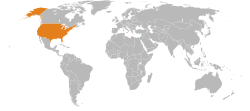US-Israel relations
 |
|
|
Israel |
United States |
|---|---|
| Diplomatic Mission | |
| Israeli Embassy, Washington, D.C. | United States Embassy, Tel Aviv |
| Envoy | |
| Ambassador Ron Dermer | Ambassador David Friedman |
Israel–United States relations are a very important factor in the United States government's overall policy in the Middle East, and Congress has placed considerable importance on the maintenance of a close and supportive relationship.
The main expression of Congressional support for Israel has been foreign aid. Since 1985, it has provided nearly US$3 billion in grants annually to Israel, with Israel being the largest annual recipient of American aid from 1976 to 2004 and the largest cumulative recipient of aid ($121 billion, not inflation-adjusted) since World War II. Seventy-four percent of these funds must be spent purchasing US goods and services. More recently, in fiscal year 2014, the US provided $3.1 billion in foreign military aid to Israel. Israel also benefits from about $8 billion of loan guarantees.
Congress has monitored the aid issue closely along with other issues in bilateral relations, and its concerns have affected Administrations' policies. Almost all US aid to Israel is now in the form of military assistance, while in the past it also received significant economic assistance. Strong congressional support for Israel has resulted in Israel receiving benefits not available to other countries.
In addition to financial and military aid, the United States also provides political support to Israel, having used its United Nations Security Council veto power 42 times with respect to resolutions relating to Israel, out of a total 83 times in which its veto has ever been used. Between 1991 and 2011, 15 vetos were used to protect Israel out of 24 in total.
Bilateral relations have evolved from an initial US policy of sympathy and support for the creation of a Jewish homeland in 1948 to an unusual partnership that links a small but militarily powerful Israel, dependent on the United States for its economic and military strength, with the American superpower trying to balance other competing interests in the region, including Russia's intentions. Others maintain that Israel is a strategic ally, and that US relations with Israel strengthen the US presence in the Middle East. Israel is one of the United States' two original major non-NATO allies in the Middle East. Late Republican Senator Jesse Helms used to call Israel "America's aircraft carrier in the Middle East", when explaining why the United States viewed Israel as such a strategic ally, saying that the military foothold in the region offered by the Jewish State alone justified the military aid that the United States grants Israel every year. Currently, there are seven major non-NATO allies in the Greater Middle East.
...
Wikipedia
